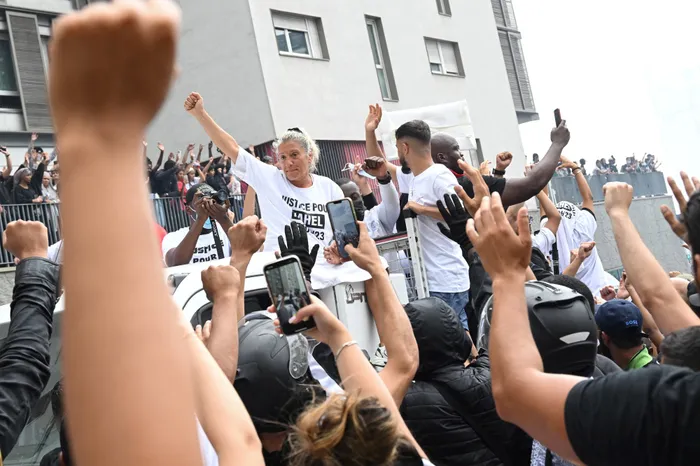Integrating immigrants into France’s economy, politics and culture

Picture: Bertrand Guay/AFP – Mounia, centre, the mother of Nahel, a teenage driver shot dead by a policeman, raises her fist at a demonstration as they hold a minute of silence during the commemoration march for her son, in the Parisian suburb of Nanterre, on June 29, 2023. Violent protests have rocked France as anger grows over the police killing of the teenager, with security forces arresting 150 people in the chaos that saw balaclava-clad protesters burning cars and setting off fireworks. Nahel was shot in the chest at point-blank range in Nanterre on the morning of June 27, 2023, in an incident that has reignited debate in France about police tactics long criticised by rights groups over the treatment of people in low-income suburbs, particularly ethnic minorities.
By David Monyae
Just a few months after the eruption of violent protests against pension reforms, France has once again been engulfed in fierce protests following the police killing of Nahel Merzouk, a 17-year-old French teenager of Algerian descent on June 27.
The police had tried to stop Nahel for what they called erratic driving and accused him of driving without licence. Nahel was shot in the chest by one of the police officers that stopped him as he was driving away apparently before the police were done interrogating. His killing sparked violent protests across France including cities like Paris, Marseille, Lyon, Lille, Pau and Bourdeaux among others.
Numerous buildings and vehicles were damaged, and shops were looted while the French government deployed tens of thousands of police officers in an attempt to contain the protests. About 300 bank branches have been vandalised, 200 shops looted and over 5,000 cars burnt as part of the damages that are predicted to cost over US$1 billion dollars. Thousands of protesters were arrested. The police officer who fired the shot was also arrested for voluntary homicide.

The French President Emmanuel Macron even cancelled a scheduled trip to Germany to stay home and address the protests. President Macron said that Nahel’s killing was “unforgivable and inexplicable” but refused to blame the police saying instead that the police was committed to protecting the French people everyday and he was grateful to them. Macron’s statement was calculated to avoid angering the police and stoking the fury of the conservative sections of the French society who mostly believe that police brutality against immigrants or non-white French citizens is justified.
However, the French Prime Minister Elisabeth Borne did not mince her words in support of the police as she pushed for a crackdown on young protesters and their parents in the French parliament. The Prime Minister accused those calling for government’s condemnation of police violence of not respecting France’s national values.
The parallel crowdfunding campaigns for the slain teenager’s family and the police officer accused of pulling the trigger serves is a clear demonstration of the deep-seated polarisation of the French society. While donations for Nahel’s family reached US$383 000, they were far outstripped by the donations for the accused officer which reached US$1.6 million by July 4. The funding for the police officer was promoted by right-wing media personalities who argued that the officer was the victim of misplace and misdirected anger.
However, the shooting of the French-Algerian teenager who also had Moroccan origins is the latest manifestation of a long-standing problem of excessive police brutality against black and Arab male citizens and immigrants in France. A 2016 study showed that black and Arab males were 20 times likely to be stopped by French police than the rest of the population. Another 2023 survey by the Ipsos polling agency showed that 91 percent of black people have experienced racist discrimination in different spheres of their lives including schools, workplaces, shops, and universities. About half of the respondents in the survey said that they had been stopped and asked for identification by the police. The official statistics were 23 percent for the entire population.
This shows that the police brutality against non-white citizens and immigrants is a symptom of a society-wide problem. Hence, the protests against Nahel’s killing reflect widespread anger in the minority and non-white populations in France at their marginalisation and discrimination. France is one of Europe’s biggest recipients of immigrants. According to official statistics, about 1 in 10 people (10 percent) in France are children of immigrants born in France. France receives almost 200,000 a year who hail mostly from North Africa and former French colonies in Sub-Saharan Africa.
One could argue that the chickens are coming home to roost for France since some of the immigrants come from countries it has helped destabilise such as Mali, Libya and Syria. However, the integration of immigrants into the French society has been difficult as they tend to be concentrated in the low-income areas characterised by high crime, poor housing, and less access to public services such as health, education, and sanitation.
Immigrants suffer from a higher unemployment rate of 13 percent compared to 8 percent for the whole population. If they are lucky to have jobs, it is mostly the low-skilled and low-wage jobs. France’s far-right parties have revelled in piling the blame on immigrants for France’s problems with high crime, terrorism, and an under-performing economy.
France’s leader of the fiercely anti-immigrant and far-right National Rally party, Marine Le Pen secured over 41 percent of the vote in France’s presidential elections in 2022 showing how a significant section of the French population subscribe to the anti-immigrant narrative. It is no wonder that that Nahel’s killing has divided the French society. Such incidents will divide the country further if action is not taken to integrate immigrants into France’s economy, politics and culture.
David Monyae is an Associate Professor of International Relations and Political Science and Director of the Centre for Africa-China Studies at the University of Johannesburg.
This article is original to the The African. To republish, see terms and conditions.